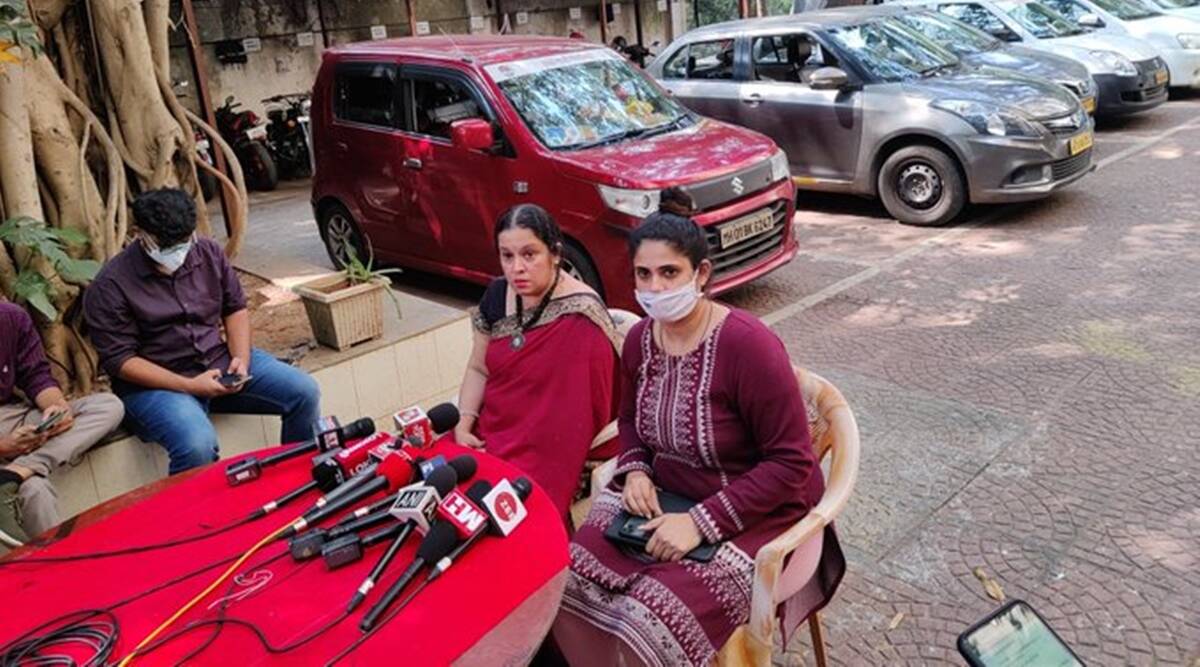 Akshata and Adnya Naik, wife and daughter of late Anvay Naik, address the media in Mumbai. (PTI)
Akshata and Adnya Naik, wife and daughter of late Anvay Naik, address the media in Mumbai. (PTI)B G Kolse-Patil, retired judge of the Bombay High Court, on Sunday expressed surprise over the closure of the Anvay Naik suicide case by the then Devendra Fadnavis government despite “strong evidence” being available.
“Abetment to suicide is like any other cognizable offence under Section 306 of the Indian Penal Code. Whoever abets the commission of a suicide is punishable with jail term of 10 years. This shows it’s a serious crime like murder or other cognizable offences,” he said.
Revealing that he had himself written to Uddhav Thackeray days after he took charge as Chief Minister, Kolse-Patil said, “But I don’t claim the case was opened because of me…”
In an abetment to suicide case, Kolse-Patil said a suicide note is the first key evidence. “However, to arrest the accused, supporting evidence is required. And in this case, supporting evidence regarding the studio work completed by Anvay Naik, some payment being made and Rs 82 lakh remaining outstanding were available,” he added. This means, said Kolse-Patil, there was “clinching” evidence available in the abetment to suicide case. “And yet, a A-summary report was filed. This was quite surprising. I don’t know why the Fadnavis government took such a step…”
A-summary report is filed when allegations made in a complaint are found true, but there can be no prosecution for lack of evidence. “Yes, A-summary report means complaint is true. When the complaint is found to be true and when requisite supporting evidence is available, there is no reason why the case should be closed,” he said.
Republic TV Editor-in-Chief Arnab Goswami and two others were last week arrested under sections 306 (abetment of suicide) and 34 (common intention) of the IPC in connection with the suicide of architect-interior designer Anvay Naik and his mother over alleged non-payment of dues by Republic TV in 2018. Naik left a suicide note, blaming Goswami and two others.
Adnya, Naik’s daughter, said, “I won’t be able to comment because the matter is sub-judice. But as we have already said in our press conference, we had submitted all supporting documentary evidence regarding the work done and outstanding payment of Rs 82 lakh. This is now in public domain.”
On the other hand, state Home Minister Anil Deshmukh said, “It seems because of political protection, Goswami and two others were not prosecuted… A senior minister in the Fadnavis government gave them political protection.”
In May, Deshmukh had announced that he has ordered a fresh probe in the case after receiving a complaint from Adnya.
Meanwhile, Kolse-Patil said he was also taken aback to find that police were denied custody of Goswami. “In this case, police had sought custody to take the investigation forward and recover more documentary evidence as alleged by the Naiks. The court rejected police custody. The court seems to have used its discretionary powers. But discretionary powers should be used for the sake of justice.”
While denying police custody, the Chief Judicial Magistrate observed that there was no connection in the suicide chain in the case which was earlier closed in 2019 and Goswami’s role. The CJM said the case had been reopened without the court’s consent and that there was no “justifiable ground” for police custody.
Regarding Goswami’s allegation Sunday that he was not allowed to meet a lawyer, Kolse-Patil said, “The accused should be allowed to meet the lawyer….”
Senior BJP leader Kirit Somaiya said, “I met the jailer at Taloja jail at 1 pm today (Sunday) afternoon. I insisted on proper care, treatment and protection for Goswami. The jailer assured me of no harassment and proper medical treatment.”
Somaiya said he also spoke to Governor Bhagat Singh Koshyari. “I requested him to see that Goswami is not harassed. He assured me he would talk to concerned officials. I also spoke to Maharashtra Home Secretary in this connection.”